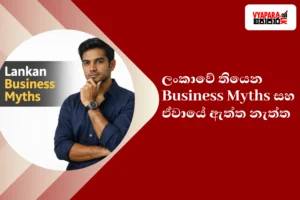Entrepreneurship is a high-wire act, balancing audacious vision with disciplined execution. Few stories capture this balance better than that of Bavaguthu Raghuram Shetty, the Indian-born tycoon who built a $10 billion empire in the UAE—only to see it collapse under hidden debts and mismanagement.
From a penniless immigrant to a celebrated billionaire, Shetty’s journey offers both inspiration and caution for Sri Lankan entrepreneurs navigating a post-crisis economy and volatile markets. Drawing from this dramatic saga, as detailed in a Times of India report, Vyapara.lk breaks down critical lessons for local business leaders seeking sustainability in Sri Lanka’s evolving landscape.
From Udupi to UAE: The Power of Relentless Hustle
Born in 1942 in Udupi, Karnataka, Shetty grew up in a middle-class family facing financial hardship. Armed with a pharmacy degree and burdened by loans, he moved to the UAE in 1973 with just seven dirhams in hand. The oil-rich nation was then ripe for opportunity.
Shetty began as the UAE’s first pharmaceutical sales representative, identifying healthcare gaps in a booming expat population. By 1975, he and his wife, Dr. Chandrakumari Shetty, co-founded New Medical Centre (NMC)—a single clinic offering affordable care. Over decades, NMC became the UAE’s largest private healthcare provider, spanning 45 hospitals across multiple continents.

He later launched UAE Exchange to serve millions of South Asian remitters and Neopharma for pharmaceutical manufacturing. His 2014 acquisition of Travelex through Finablr marked a global leap, while NMC Health’s 2012 London Stock Exchange listing cemented his legacy. At its peak, NMC was valued at $10 billion; Shetty’s fortune exceeded $3.5 billion.
Lesson 1: Spot and Solve Market Gaps with Immigrant Grit
Sri Lanka’s post-2022 economic recovery mirrors the UAE’s early growth phase—fertile ground for innovation. From fintech and rural healthcare to tourism and sustainable agriculture, gaps abound. Shetty succeeded by solving real problems, not chasing hype.
A Sri Lankan founder could replicate this model: a telemedicine startup for rural clinics or a diaspora-focused savings app. His story proves that limited capital is no barrier—vision, persistence, and deep local insight are the true currency of success.
The Fall: When Ambition Outpaces Oversight
In December 2019, a report by Muddy Waters Research accused NMC of inflating assets and concealing billions in debt. Panic ensued; investigations revealed $4 billion in undisclosed liabilities and forged documents.
By early 2020, Shetty resigned, blaming “rogue executives.” NMC collapsed into UK administration—the Middle East’s largest corporate failure. UAE Exchange halted operations, and Finablr fell into insolvency. Over 80 banks faced losses, and Shetty now faces a $46 million judgment from the Dubai DIFC Court, with lawsuits alleging fraud.
Lesson 2: Build Robust Governance to Survive Scrutiny
Growth without governance is a ticking time bomb. Shetty’s collapse underscores the dangers of unchecked control and poor oversight. Sri Lankan businesses, especially those scaling under BOI incentives or seeking foreign investors, must prioritize transparency.
Independent audits, ERP systems, and diverse boards help detect irregularities early. In Sri Lanka’s tight-knit business scene, credibility is currency—once lost, it’s nearly impossible to rebuild. Shetty’s defense of “ignorance” was dismissed as deceit; Lankan founders must embed integrity at every level.
Diversification: A Double-Edged Sword
Shetty’s empire thrived on diversification—healthcare, remittances, and pharmaceuticals—each reinforcing the other. But his later overreach, fueled by leveraged acquisitions like Travelex, turned diversification into downfall.
Lesson 3: Diversify Strategically, Not Recklessly
Diversification works when it strengthens your core. Sri Lankan entrepreneurs—garment exporters exploring sustainable fashion or tea brands entering agritech—should pursue synergy, not sprawl.
In a fragile, IMF-monitored economy, over-leverage is fatal. Use scenario planning: simulate currency shocks or tourism dips. Build resilience before expansion. Shetty’s downfall shows that diversification without fiscal discipline becomes dilution.
Reputation: From Padma Shri to Pariah
Once celebrated with India’s Padma Shri and global accolades, Shetty’s image disintegrated under scandal. Despite philanthropy and hospital donations, his credibility evaporated—proof that reputation, not revenue, sustains legacy.
Lesson 4: Lead Ethically and Prepare for Crises
Ethical leadership is a survival strategy, not a virtue signal. Shetty’s silence and blame-shifting deepened his fall. Sri Lankan founders must build crisis communication frameworks, designate spokespeople, and face crises head-on.
Transparency and accountability restore trust faster than denial. Joining networks like SLASSCOM or Ceylon Chamber of Commerce adds oversight and mentorship.
The Human Factor: Balancing Family and Business
Shetty’s reliance on family created early strength but later exposed governance cracks—his son-in-law, a key executive, was implicated in financial irregularities.
Lesson 5: Professionalize Family Ventures
Sri Lanka’s family-run enterprises dominate sectors like retail, apparel, and plantations. Family loyalty can fuel success, but unchecked it breeds complacency. Implement external audits, clear hierarchies, and succession plans.
As your business grows, bring in outside professionals—non-family CFOs, advisors, and independent directors—to ensure accountability.
The Ultimate Takeaway: Vision with Vigilance
B.R. Shetty’s saga—from $2 in his pocket to a $10 billion empire, then to courtroom battles—is a mirror for ambition’s highs and lows. He showed Sri Lankan entrepreneurs how to spot gaps in booming markets, hustle with limited means, and diversify intelligently. But his collapse screams that empires built on shaky foundations—opaque finances, weak oversight, unchecked growth—crumble fast.
For Sri Lanka’s innovators, rebuilding amid economic recovery, Shetty’s story is a call to action. Innovate fearlessly, but govern fiercely. Leverage the island’s post-crisis opportunities—tourism’s 2025 boom, fintech’s digital surge, or sustainable agriculture’s global appeal—but anchor every move in transparency and ethics. In a world of short-sellers, regulators, and economic volatility, sustainable wealth isn’t in billion-dollar valuations; it’s in legacies that endure scrutiny and time.





